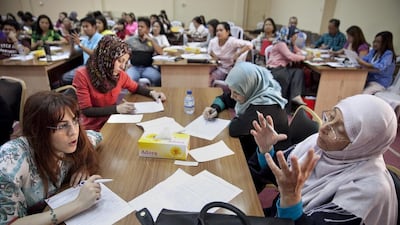RAS AL KHAIMAH // Mandatory training for public school teachers is often repetitive, irrelevant or provided by unqualified instructors, a study has suggested.
The UAE has one of the highest rates of teachers taking part in professional development, at 92 per cent, but the survey shows discontent with its quality.
“Clearly, there is a lot of good stuff going on in the professional development workshops and then there is a lot that is not,” said Dr Elizabeth Buckner, a visiting scholar with the Sheikh Saud bin Saqr Al Qasimi Foundation for Policy Research.
“It’s very hit or miss and I do think there needs to be that quality control, just making sure it’s more uniform.”
Researchers interviewed about 1,000 teachers from lower secondary levels at two government schools for boys and two for girls in Abu Dhabi last January.
“Teachers’ most negative feedback centred on workshops and training mandated by education authorities,” said the study, co-authored by Dr Buckner.
“Teachers complained that many workshops were repetitive, contained irrelevant training materials, or were conducted by unqualified instructors.
“Teachers expressed a desire for more targeted training related to classroom management skills, incorporating information and communications technology into their classrooms, and parental and community involvement.
“One male teacher said, ‘We’re supposed to be doing smart learning but we don’t know how to use the smartboards, and we don’t have a system for cooperation for sharing worksheets and other resources’.”
Teachers also said they would like more training in teaching children with special needs.
The rate of teachers taking part in development compared with an average of 88.4 per cent for nations in the Organisation for Economic Cooperation and Development, which runs the survey.
The study was part of the Teaching and Learning International Survey, or Talis 2013, which surveyed teachers and principals from more than 30 countries every five years about their working conditions and learning environment.
The researchers list a number of recommendations on how to make professional development more effective for local teachers. Most notably, said Dr Buckner, it should be customised to each teacher’s specific needs.
“One of our most important recommendations is offering a menu of options,” she said. “You need different workshops and have teachers choose. It’s more work but I think it’s worth doing.”
Teachers should also be empowered to give feedback on their professional needs and there should be stronger measures for quality control, said Dr Bruckner.
The study’s co-author, Justina Kindreich, a graduate of Columbia University’s International Educational Development at Teachers College, agreed that teachers should have a say in the type of training they are offered.
“It also might help if teachers had the chance to be more involved, by either letting their voices be heard on what they would like to be taught, or being able to participate or teach in their training,” Ms Kindreich said.
“It might be worth the investment to take more time to ask teachers what they want and what they feel is needed, as they are on the front line of the profession, and take their words into serious consideration.
“This can not only help to avoid the loss of teachers from burnout, but also help with teacher motivation if they feel their needs are being met.”
rpennington@thenational.ae

